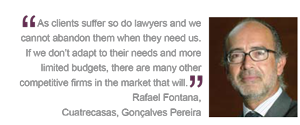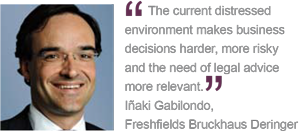Madrid Annual Report 2013: Attracting Capital
Still firmly on the road to recovery, Madrid is on a drive for economic growth, fuelled by a need to attract capital and foreign investment. Competition is high, and the Capital´s law firms are taking a proactive approach to the realities they face. This is no longer ‘a crisis’, they say, but ‘the new normal’.
You cannot hide from the economic crisis that still has a firm grip on the Iberian Peninsula. And the past years have been a rollercoaster ride of epic proportions.
Since 2008, Spain has been battling one of the worst crises in its history, and while year-on-year there has been hope that recovery is around the corner, it has, to-date, proved an elusive companion.
“Everything has changed in recent years,” says Iñigo Gómez-Jordana, Managing Partner at Allen & Overy in Spain. “The client base has shrunk, the work has gone from capital expansion to capital reduction, and the whole environment is different, including the types of clients, services provided and deals.”
At the heart of the country lies its Capital, which has taken a hard knock in recent years. But behind the scenes, the Government has been making steps to increase its attractiveness, with friendlier policies to attract international businesses, investors and much needed capital. Madrid is on a nationwide drive for economic growth, say lawyers, and its advantages as a key European business centre are still very significant.
The Capital
In amongst a constantly changing economic climate, Madrid remains a key strategic ‘hub’ for business. But the city’s attractiveness has more to do with openness and dynamism rather than with housing its administrations, says Pedro Pérez-Llorca, Senior Partner at Pérez-Llorca “Being the seat of a government is no longer a significant advantage in a ‘government-crowded’ country such as ours. I believe success is strongly related to the capacity to attract professionals from other places in and outside of Spain.”
During recent years Madrid has been able to attract a substantial part of the country’s foreign investment. And if foreign investors considering entering the Spanish market have to choose a city, they will logically choose Madrid, says Luis Briones, until recently the Managing Partner at Baker & McKenzie in Spain. And if the flow of foreign investments increases, adds Francisco G. Prol, Founding Partner at Prol y Asociados, Madrid will certainly be the “gate” through which those investments will be channelled to the rest of the country.
The Capital has gained importance in recent years over other regional cities, but this is not something to be proud of, according to Juan Jiménez-Laiglesia, Co-Managing Partner of DLA Piper in Spain, as it affects the health of the country as a whole. For example, the growing imbalance between Madrid and Barcelona should not been seen as one triumphing over the other, but rather as a cause for concern.
“Madrid and Barcelona are the two wheels of the Spanish bicycle,” says Luis de Carlos Bertrán, Managing Partner at Uría Menéndez. “If they work in harmony things are great, but if not then this causes problems for the country as a whole.”
 Adapting to change
Adapting to change
The Madrid legal market is becoming more and more competitive in terms of winning work and fees, and therefore the law firm business model has had to undergo some reshaping. According to Briones at Baker & McKenzie Madrid – as the market changes, so does the way companies do business, and the same goes for law firms.
“Our clients, mostly international leaders in their economic sectors, have also changed,” says Eduardo Gracia, Managing Partner at Ashurst in Madrid, “so our challenge is to be able to fully understand their new needs and to share with them goals and projects.” In order to achieve this, firms need to evolve at the same speed as the market changes.
“Most of us are adapting to what the Americans call ‘The new normal´,” says Manuel Martín at Gómez-Acebo & Pombo, a new period and length of time with slow economic activity that will be seen in the coming years as a ‘normal’ situation. “In the current environment some matters require more partner and senior associate time, and less junior lawyer time, and consequently leverage is reducing and pyramids tend to narrow.” But it seems that most law firms in Madrid are understanding these changes and adapting well to the new situation.
And Madrid’s law firms are developing a much more aggressive model from a commercial standpoint, and the legal market is becoming one in which the client holds a position of strength. “Competition has left firms with no choice but to take a more proactive approach to understanding their clients’ businesses in order to offer first-rate and more efficient advisory services, since clients are on the lookout for expert advice at an affordable price,” says Fernando Vives, Managing Partner at Garrigues. Moreover, there is a trend of firms seeking to offer international expertise and experience, taking a leading role in the legal handling of deals made outside Spain, but with the backing of local lawyers.
There is also more emphasis than ever on clients requesting more senior and experienced advisers. This is obliging law firms to re-think gearing and pricing methodology and, generally, to have open and often useful conversations with clients on expectations and perceived input by law firms, according to Iñaki Gabilondo, Managing Partner of Freshfields Bruckhaus Deringer in Spain. And in most cases, this allows for closer and more satisfactory relationships.
Reacting
Law firms are therefore trying to combat the crisis by enhancing and streamlining professional management, overheads and billing and collection, says Isidro Del Saz, Managing Partner of the Madrid office of Roca Junyent, and also competing in budgets – sometimes very aggressively – to attract new customers or retain existing ones. And as competition is high, retaining clients is essential at a time when new ones aren´t knocking at your door, adds Serena Argente Escartin from the Madrid office of Portuguese law firm Raposo Bernardo.
“From our perspective, what firms have to do in the current environment is to be efficient, to understand their clients businesses and to provide practical and solution-oriented advice,” says Rafael Montejo, Managing Partner of Osborne Clarke in Madrid. And it makes sense that clients’ expectations will be driven by an in-depth knowledge of their business in order to provide effective solutions. “They are not willing to invest resources if they have to explain their business to us,” adds Jaime Velázquez, Managing Partner at Clifford Chance in Spain.
An interesting side effect of the crisis has been a noticeable shift in the roles of the lawyers themselves. “There have been important changes in industry as we have evolved from a supply-driven to a buyers’ market,” says Juan Jiménez-Laiglesia, Co-Managing Partner of DLA Piper in Spain. And law firms are responding by becoming far more flexible in terms of the services provided, and, adds Jiménez-Laiglesia, it is amazing how many lawyers are crossing over into areas outside of their specialities to adapt to client demands.
The lawyer is becoming a part of the client’s team and must provide not only legal advice, but also common sense and experiences, and “invest” with the client before the business opportunity appears, according to Francisco Solchaga, a Partner at Araoz & Rueda. Additionally, clients are asking lawyers to help them with ideas to generate business, and looking for innovative strategies and solutions. And added value can mean the difference in the client’s perception of the success or failure of the legal service, says Andrés Monereo, a Real Estate Partner at Monereo Meyer Marinel-lo Abogados.
“As clients suffer so do lawyers and we cannot abandon them when they need us. If we don’t adapt to their needs and more limited budgets, there are many other competitive firms in the market that will,” says Rafael Fontana, Chief Executive Officer of Cuatrecasas, Gonçalves Pereira. “We do, however, have to consider ourselves lucky as a profession, because if you look out the window you see how many companies and people on the streets are suffering. We may not be making the same fees, but we are working.”
But, says Carlos Pazos, a Founding Partner of the Madrid office of SJ Berwin, only time will tell who has taken the right decisions and followed the right path. 
What clients want
Clients are clearly demanding solutions to increasingly complex problems, often related to the crisis. A multidisciplinary approach, therefore, is becoming more and more of a necessity. This is not only from a legal point of view, but also as an approach combining other industry-oriented practices in financial services, technology, business restructuring, etc. “Moreover,” says Joaquín Latorre, a Partner at PwC Tax & Legal Services, “clients are demanding quick ‘down to earth’ solutions that respond to their real needs and, in many cases, also with an international focus”.
And lawyers are seeing an expansion in multidisciplinary practices. As more and more clients are demanding a multi-specialisation offering of services to assist them in their projects, says Alberto Echarri, Managing Partner at Ernst & Young Abogados, and wanting a seamless ‘all in one’ solution with just the one provider.
Some of the key areas where clients are seeking advice, say lawyers, relate to reforms, financing, restructuring and insolvency, labour and employment, and dispute resolution. According to Vives at Garrigues, the reforming enthusiasm in Spain, with constant laws and regulations setting in place new rules in the areas of tax, labour and administrative law and, above all else, the regulation of the finance sector, has brought about a barrage of modifications. “In many cases, due to the hurry in which they were drafted, these cause our clients interpretation-related doubts that, in turn, require consultation or checking with specialist law firms.”
Due to the major and much-needed restructuring and recapitalisation of some banking institutions, as well as the active supervisory role of the Bank of Spain, regular loan financing has been cut off and both large and mid-sized companies are being forced into the bond market to meet their funding needs, says Juan Manuel de Remedios, Executive Partner and Head of the M&A/Corporate Group of the Madrid office of White & Case. “Companies have therefore been inquiring about access to the bond market and all the alternative financing options to get away from banks.”
The 2012 Labour Law Reform, giving rise to many controversies and extra-advice is needed due to a lack of case law. And the crisis has urged in-house legal departments to focus on matters such as labour restructurings and to fight against existing delays in payments, says Ignacio Legido, Managing Partner at BDO Abogados.
“The current distressed environment makes business decisions harder, more risky and the need of legal advice more relevant,” says Iñaki Gabilondo, Managing partner of Freshfields Bruckhaus Deringer in Spain. Therefore, assessing issues such as corporate benefit, market conditions and practices, and price expectations, for example, is putting additional pressure on the decision makers.
“For several years now we have been advising clients in connection with positions that, because of the fundamental change in circumstances, had become or were close to becoming unsustainable – high debt, low productivity, scarce financing and the like.” says Pedro Pérez-Llorca, Senior Partner at Pérez-Llorca. “And I might be over-optimistic, but I believe the focus is moving to new markets, new projects, and new sources of finance.”
New practice prospects
The good news is that there are growth opportunities abound in Madrid, say lawyers. From a purely legal perspective, companies will require consultants who will advise them on how to broach pre-liquidation, insolvency and refinancing situations, says Luis Fernando Guerra, Managing Partner at Deloitte Abogados. From a financial perspective, services associated with ‘Business Model Optimisation’ will be in great demand, he adds, given that companies are engaged in reassessing their business model and their value chain – the range of activities to bring a product from conception to end use.
New opportunities are also arising on sectors like IT, tax and labour. In the long run, there should be a need for capital markets law as the credit restrictions force the most dynamic companies to tap the stock exchanges as an alternative source of financing, according to Hugo Écija, Managing Partner at Ecija. Madrid also presents great opportunities for sectors with a technological and innovative basis, and also to drive other the growth of other more mature areas in the region.
“Compliance related work (FCPA & Bribery Act) is due to see a rise, as Spanish companies are internationalising more and more,” says Huerta, at Hogan Lovells. “Some are taking this matter very seriously. It seems others will need a big case involving a Spanish company to realise how important it is.”
Madrid is now an ideal place to find bargains with cash-strapped banks, cajas, companies and individuals. And so a certain degree of interest is being shown in investment transactions as country risk has disappeared from the equation, adds Álvaro Sainz, Senior Partner at Herbert Smith Freehills Spain. The country is increasingly perceived as one with attractive prices and valuable assets.
Market sales channels are also evolving and becoming more sophisticated, with traditional commercial networks being replaced by e-commerce and other new techniques, to maximise sales and reduce fixed costs, according to Rafael Alonso, Managing Partner at Squire Sanders in Spain. And consumer and date privacy concerns are increasing due to the massive growth of e-commerce.
There is also a remarkable capacity of entrepreneurs to generate new business and ideas, says Lourdes Pérez-Luque, a Tax Partner at Dentons in Spain. Some examples include the ‘contact centre’ industry that is gaining major importance, and venture capital – companies interested in new technologies that are supported for investors.
Finally, if the markets improve, there could be some IPO work with the Government selling part of its interests in AENA (airport holding company) and the Lotteries, says Alejandro Fernández De Araoz, a Partner at Araoz & Rueda.
 Moving forward
Moving forward
Madrid’s legal market is still deep in a period of uncertainty, as characterised by a decrease in many firms’ turnover for the third year in a row.
But Madrid has a remarkable volume of business, says Francisco Palá Laguna, Managing Partner of Ramón y Cajal Abogados, which is one of its opportunities and strengths. And the good news is that the outlook for the year ahead is promising, say lawyers, as long as they capitalise on the new practice areas and ensure to continue addressing any structural or management issues to give themselves the flexibility to survive a market that is still full of surprises.
Given the times, law firms need to better adapt their business model to the market to be able to meet client´s requirements when delivering legal services and transactional support, and be increasingly profitable, says Jaime Velázquez, Managing Partner at Clifford Chance in Spain. “The discussion right now is exactly how to approach this issue.”
Law firms must also focus on how to structure their services and make them as attractive and useful as possible, providing full legal solutions that the market is actually demanding, says Adolf Rousaud, Managing Director at Rousaud Costas Duran and with experts and professional teams that are more dynamic and competitive.
In any case, the foundations for the future are being established, says Manuel Broseta, Managing Partner of Broseta, and the strength and speed at which we recover growth and development depends on us. Imaginative solutions are very important in order to offer differentiated advice that distinguishes a firm from the competition – and there is no margin for error.
Sectors
For Madrid law firms, the most active sectors at the moment related to divestments, debt refinancing, tax, litigation, labour and insolvency, with the most active industries being energy, construction, infrastructure and privatisation.
Regulatory reform – from Basel III to Dodd-Frank – continues to be a hot topic, adds Michael J. Willisch, Head of the Madrid Office at Davis Polk & Wardwell in Spain, as financial institutions and corporates continue to need to re-think and modify their activities in response to an ever-changing regulatory landscape. And there is still potential in areas such as compliance due to increasing regulation all over the world, adds Agustín Bou, Head of Restructuring and Insolvency at Jausas.
And law firms are currently being led by the economy and how their clients are responding to this, says Rafael Suárez de Lezo, Co-Managing Partner at CMS Albiñana Suárez de Lezo. “Litigation is increasing, for example, and we are seeing many more insolvencies, renegotiations of loans, etc.”
Litigation is, lawyers agree, at an all time high, as are arbitration disputes arising after the fact. “Agreements that were happily drafted during good times are being subject to a screening process today,” explains Gonzalo Stampa, Managing Partner at Stampa Abogados.
But the actual income litigation-related generates in no way replaces the levels corporate and M&A used to. “Furthermore prices can be incredible low for cases with a great deal of complexity,” says José Luis Huerta, Managing Partner at Hogan Lovells in Madrid. “And complexity means more time and more seasoned lawyers dealing with them – a difficult equation.”
In tax in particular, lawyers have never been busier, says Briones at Baker & McKenzie Madrid but the work itself is different. “Clients now mainly require preventative advice on avoiding risks.”
The real estate business keeps on giving, despite the crisis, with clear business chances for investors seeking business opportunities and especially low prices whose value will be maintained along for the next five years, as per the last reports published by sector specialists, according to Marc Gil Van Beveren, Head of Corporate & Banking at Adarve Abogados. “It is clearly the time to invest in Spanish real estate.”
The privatisations will also attract a lot of interest as well – AENA, Cesce, privatisation of hospitals, etc – as will the restructuring of banks and the public sector, for example a rise in PPP/PFI models.
Pricing
Pricing is a problem across the practices, but lawyers agree that Spanish firms are very competitive when it comes to fees compared to the international or European ones.
But pricing is a sensitive issue for clients at the moment and lawyers need to be extremely careful, says Javier Ibáñez Gabernet, Managing Partner of Eversheds Nicea. “The challenge is trying to match the highest level of quality with the price clients want to pay. We are having to become a lot more efficient.”
However, lawyers recognise the necessity for flexibility on fees. “We have been understanding with those clients for whom we have worked with for many years during boom times and now during harder times,” says Mercedes Fernández, Managing Partner of Jones Day in Spain.
Given the increasingly smaller legal budgets, legal work which is externalised has decreased. Many clients ask for economies of scale and alternative fee arrangements.
Law firms are now constantly asked by clients to provide cap fees, which in some instances due to the inherent unpredictability of legal works, seems an impossible task.
“We understand that in order to get to successful fixed-fee arrangements both for the firm and the client, it is paramount to engage in conversations to assess the value of the work to the client, the current and future state of the relationship and other factors,” according to de Remedios of White & Case. “This may help both parties to reach a win-win solution – you don’t want an unsatisfied client but neither does the client want a lawyer entering into such an uneconomic engagement that right in the middle of a transaction they are not incentivised to use all the required and best sources to advice the client.”
The model of billing by the hour is over, says Carlos Serrano Rodríguez, a Partner at Grant Thornton in Spain. “The lawyer has to know how to step into the shoes of the customer and offer him a product that perfectly suits their needs, providing flexible and innovative solutions.”












